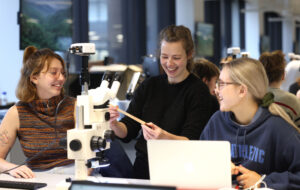How you'll learn
You’ll learn through a combination of teaching, learning and assessment methods in line with the varied nature of the programme.
You’ll attend lectures, seminars and tutorials and take part in practical sessions, such as project work and field visits. You are encouraged to take a proactive approach to their learning.
You will plan and organise your studies both on an individual basis and working in groups, take an active role in seminars, class discussions, library and IT studies and make practice contacts and site visits associated with coursework submissions.
How you're assessed
You’ll be assessed through a combination of coursework, such as essays, reports, seminar presentations and examinations. Essays, reports, seminars and discussion papers enable you to explore particular components of the course in-depth and present coherent arguments using a range of writing styles, suitable for different audiences.
Seminar presentations provide opportunities for you to develop and demonstrate your ability in presenting and defending your arguments. Group projects enable you to demonstrate, through verbal presentations, written reports or design work, your ability to work as part of a team to resolve large and complex problems. Examinations test knowledge, understanding and critical reflection on a range of materials covered in a module.
You will also take part in a final project based on a topic associated with your specialism. You’ll work independently to develop and demonstrate research skills and apply knowledge to a specific research problem. You’ll be specifically assessed on your initial presentation, your research outline, and your dissertation.
Liverpool Hallmarks
We have a distinctive approach to education, the Liverpool Curriculum Framework, which focuses on research-connected teaching, active learning, and authentic assessment to ensure our students graduate as digitally fluent and confident global citizens.
The Liverpool Curriculum framework sets out our distinctive approach to education. Our teaching staff support our students to develop academic knowledge, skills, and understanding alongside our graduate attributes:
- Digital fluency
- Confidence
- Global citizenship
Our curriculum is characterised by the three Liverpool Hallmarks:
- Research-connected teaching
- Active learning
- Authentic assessment
All this is underpinned by our core value of inclusivity and commitment to providing a curriculum that is accessible to all students.









